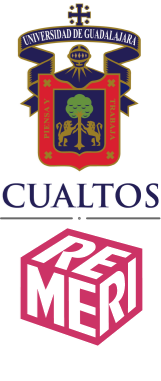Please use this identifier to cite or link to this item:
http://repositorio.cualtos.udg.mx:8080/jspui/handle/123456789/1189Full metadata record
| DC Field | Value | Language |
|---|---|---|
| dc.contributor.author | Islas Torres, Claudia | - |
| dc.date.accessioned | 2021-11-18T18:24:57Z | - |
| dc.date.available | 2021-11-18T18:24:57Z | - |
| dc.date.issued | 2021-06 | - |
| dc.identifier.citation | Islas Torres, C. (2021). Conectivismo y neuroeducación: transdisciplinas para la formación en la era digital. CIENCIA Ergo-Sum, 28(1). doi:10.30878/ces.v28n1a11 | es, en |
| dc.identifier.issn | 2395-8782 | - |
| dc.identifier.uri | http://repositorio.cualtos.udg.mx:8080/jspui/handle/123456789/1189 | - |
| dc.description | Artículo | es, en |
| dc.description.abstract | Resumen Se hace una revisión de la literatura con el objetivo exponer crítica y analíticamente cómo el conectivismo y la neuroeducación son transdisciplinas que explican procesos formativos en la era digital. La información develó dinámicas e interpretaciones desde diferentes posturas epistémicas. En la fase heurística se tomaron criterios como año de publicación, idioma, metodología, hallazgos; se procedió a la fase hermenéutica donde se interpretó y concluyó que la era tecnocientífica ha traído consecuencias y cambios en los sistemas de enseñanza-aprendizaje, por lo que se requieren referentes que adviertan cómo es el aprendizaje y la construcción de conocimiento no necesariamente en la mente sino a través de dispositivos e infraestructuras tecnológicas que obligan también a la comprensión del funcionamiento del cerebro. Abstract The review of the literature presented was goal critically and analytically exposing how connectivism and neuroeducation are transdisciplines that explain formative processes in the digital age. The information revealed dynamics, and interpretations of these, from different epistemic positions. In the heuristic phase criteria were taken such as: year of publication, language, methodology, findings. We proceeded to the hermeneutic phase where it was interpreted and concluded that the techno-scientific era has brought consequences and changes to the teaching-learning systems, so references are required that warn what learning and knowledge construction are not necessarily in the mind, but through devices and technological infrastructures, also forcing the understanding of the the brain’s functioning. | es, en |
| dc.language.iso | es | es, en |
| dc.publisher | Universidad Autónoma del Estado de México | es, en |
| dc.relation.ispartofseries | CIENCIA Ergo-Sum;Vol. 28 Núm. 1 (2021) | - |
| dc.subject | conectivismo | es, en |
| dc.subject | neuroeducación | es, en |
| dc.subject | proceso de formación | es, en |
| dc.subject | enseñanza-aprendizaje | es, en |
| dc.subject | transdisciplina | es, en |
| dc.subject | conectivism | es, en |
| dc.subject | neuroeducation | es, en |
| dc.subject | teaching process | es, en |
| dc.subject | teaching-learning | es, en |
| dc.subject | trans-discipline | es, en |
| dc.title | Conectivismo y neuroeducación: transdisciplinas para la formación en la era digital | es, en |
| dc.title | Connectivism and Neuroeducation: Trans-disciplines for teaching in the digital era | en |
| dc.type | Article | es, en |
| Appears in Collections: | 5801 Artículos | |
Files in This Item:
| File | Description | Size | Format | |
|---|---|---|---|---|
| Conectivismo y neuroeducción_trasdisciplinas para la formación en la era digital.pdf | Documento | 837.96 kB | Adobe PDF | View/Open |
| Enlace a_Conectivismo y neuroeducación_ transdisciplinas para la era digital.htm | Enlace a publicación | 47.48 kB | HTML | View/Open |
Items in DSpace are protected by copyright, with all rights reserved, unless otherwise indicated.


